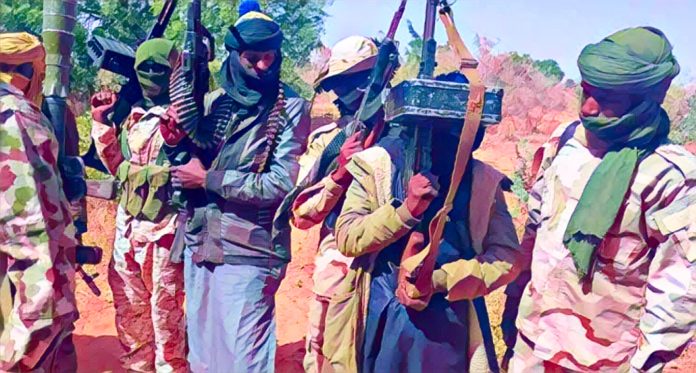Key Points
-
Over 270 terrorist enclaves have been identified across Nigeria.
-
The report exposes major hotspots in Zamfara, Katsina, and Niger.
-
Security experts call for stronger coordination and intelligence sharing.
Nigeria is bleeding from its ungoverned spaces. Across forests, creeks, and highways, armed groups have taken hold, pushing citizens to the edge of survival.
Every region now has its own war zone. From Edo’s thick forests to Bayelsa’s tangled creeks, the pattern is the same — fear, blood, and silence.
In villages once full of farmers and traders, families now whisper about who might be taken next. Roads that once bustled with markets now carry more guns than goods.
Security agents continue to raid camps and hunt kidnappers, but for every hideout destroyed, another appears. The fight has become a slow war without borders or victory.
Edo: Forests of fear
In Edo, kidnappers and criminal herdsmen rule with ease. The Benin–Abraka, Benin–Auchi–Okene, and Sapele roads are among the most dangerous.
Victims vanish into the forests and emerge days later, if at all, only after ransoms are paid.
Commissioner of Police Monday Agbonika said joint operations with the Army, Air Force, and Civil Defence are ongoing.
“The bush combing will continue until all criminal elements are flushed out,” he said.
Over 1,200 operatives have been deployed. Drones now hover over the forests, recording every movement.
Bayelsa: Rivers and creeks of crime
Bayelsa’s waterways have become passageways for pirates, cultists, and armed robbers.
In Yenagoa, flashpoints like Swali, Okaka, and Tombia Roundabout are now heavily patrolled.
Police spokesperson Musa Mohammed said a new “law enforcement governance system” using tactical units, intelligence, and drones is taking shape.
CCTV installations are underway in Yenagoa to help track criminal movement through the creeks.
Akwa Ibom: Pirates on the waterways
In Akwa Ibom, kidnappers strike along the Oron–Calabar waterways. Twenty passengers were abducted in April alone.
Commissioner of Police Baba Mohammed Azare said six Cameroonian suspects have been arrested, while hotel operators are warned against harbouring kidnappers.
Governor Umo Eno voiced his frustration. “You can’t say you don’t know what people in your community are doing,” he said. “We’re taking the fight to the creeks.”
Delta: Kidnappers’ stronghold
In Delta, kidnappers dominate the railway line in Abraka and the forests of Ika South and Ika North East.
In Mbiri, two locals were killed this year by armed herdsmen. Forest communities like Uwheru and Uduophori remain trapped under fear.
Police spokesman Bright Edafe said tactical teams have neutralised about 10 kidnappers in recent months, but residents dispute claims of improvement. “They still come at night,” a commuter in Warri said quietly. “We just pray not to be seen.”
Northern states: Hidden camps and bloody trails
Across the North, criminals exploit difficult terrains to build invisible kingdoms.
Kebbi now counts Aliero Bypass and Badariya as deadly zones.
Benue bleeds from daily attacks along Agatu-Apa-Otukpo-Ogbadibo and Ukum-Logo-Katsina-Ala routes.
Kaduna’s Kawo Bridge and Rijana–Katari axis have become synonymous with death.
Kwara harbours 55 dangerous enclaves from Lafiaji to Eruku.
Niger State counts over 18 LGAs under siege, with 152 farmers killed and 355 kidnapped in just six months.
Governor Dikko Radda of Katsina said the state “is not yet where we need to be,” as 50 corridors of death stretch across 26 LGAs.
The North-East: Old enemies, new fronts
In Borno and Yobe, Boko Haram and ISWAP continue to attack Maiduguri–Damaturu and Monguno–Baga roads.
IEDs still explode on dusty highways, and troops face ambushes once they pull back. AIG Kenechukwu Onwuemelie urged citizens to remain vigilant.
In Adamawa, the porous border with Cameroon feeds a steady stream of weapons. Villages like Gombi, Michika, and Madagali still live under the shadow of Sambisa’s forest fighters.
The North-West: Bandit capital
Zamfara remains the operational hub of bandits. Forests like Dansadau, Sububu, and Munhaye connect to Niger Republic and neighbouring states, forming a web of hideouts.
Sokoto’s eastern LGAs are now called the “Axis of Evil,” where mass abductions and cattle rustling dominate daily life.
South-West: Shadows in the cities
Even the South-West isn’t spared.
In Lagos, places like Okokomaiko, Mile 2, and Mushin have become robbery zones. “One-chance” gangs roam the streets, and under-bridges in Apapa and Cele have turned into night traps.
Ondo and Ekiti face attacks on border highways. In Ado-Ekiti, brothels and parks in Atikankan and Odo-Ado serve as hideouts for drug dealers and cultists.
Ogun and Oyo battle recurring cult clashes and robberies on highways.
A fragile peace
From Sokoto to Yenagoa, citizens live with fear as constant as the harmattan dust. Many feel forgotten, waiting for help that never comes.
Security agencies say progress is slow but steady. Patrols, drones, and local collaborations are expanding. Yet, in the dark corners of Nigeria’s forests and creeks, gunmen still rule.
Until these enclaves are reclaimed, peace will remain fragile, and the promise of safety just another echo in the distance.



